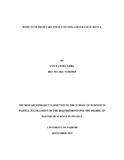| dc.description.abstract | Despite the embracing of monetary policies by developing countries, most of them still find themselves entrenched in a never-ending cycle of inflation. The cycles of inflations end up destroying counties’ pride, and to some extent, their sovereignty monetary policy actions are followed by movements in real output that may last for two years or more. Monetary transmission mechanism has been a subject of much research over a number of years. This study, therefore sought to determine the effects of monetary policy on inflation in Kenya. The study adapted descriptive survey approach in collecting data from the respondents. The descriptive survey method was preferred because it ensures complete description of the situation, making sure that there was minimum bias in the collection of data and finding out the what, where and how of a phenomenon. This study used secondary data for the specific variables which are inflation, money supply, 91 day-Treasury bill rate and foreign exchange rate. The data on inflation (CPI) was obtained from KNBS while data on 91-day Treasury bill rate, exchange rate and money supply (M3) was obtained from the CBK website which it is public data. The study concluded that there was a positive correlation between inflation rate and the independent variables. In addition, the study concluded that the 91 day T Bills Rate is the main influencer of the inflation rates in Kenya. This is because it represents the risk free investment for investors. In the second place is the money supply. In addition the study concluded that all the variables (91-Day Treasury bill rate, exchange rates and money supply) considered together influence the inflation rate by only 26.1%.The study concluded that monetary policies affect inflation rates. This is because through the monetary policy tools, the monetary Committee influences the amount of money in circulation. The study concluded that the 91 day T Bills Rate is the main influencer of the inflation rates in Kenya. This is because it represents the risk free investment for investors. In the second place is the money supply. | en_US |

